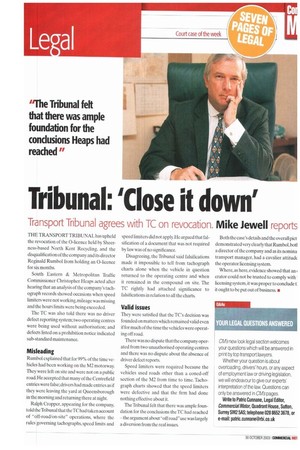Tribunal: 'Close it down'
Page 31

If you've noticed an error in this article please click here to report it so we can fix it.
Transport Tribunal agrees with TC on revocation. Mike Jewell reports THE TRANSPORT TRIBUNAL has upheld the revocation of the 0-licence held by Sheerness-based North Kent Recycling, and the disqualification of the company and its director Reginald Rumbol from holding an 0-licence for six months.
South Eastern & Metropolitan Traffic Commissioner Christopher Heaps acted after hearing that an analysis of the company's tachograph records showed occasions when speed limiters were not working, mileage was missing and the hours limits were being exceeded.
The TC was also told there was no driver defect reporting system; two operating centres were being used without authorisation; and defects listed on a prohibition notice indicated sub-standard maintenance.
Misleading
R um bol explained that for 99% of the time vehicles had been working on the M2 motorway. They were left on site and were not on a public road. He accepted that many of the Centrefield entries were false;drivers had made entries as if they were leaving the yard at Queensborough in the morning and returning there at night.
Ralph Cropper, appearing for the company. told the Tribunal that the TC had taken account of "off-road/on-site" operations, where the rules governing tachographs, speed limits and speed limiters did not apply. lie argued that falsification of a document that was not required by law was of no significance.
Disagreeing, the Tribunal said falsifications made it impossible to tell from tachograph charts alone when the vehicle in question returned to the operating centre and when it remained in the compound on site. The TC rightly had attached significance to falsifications in relation to all the charts.
Valid issues
They were satisfied that the TC's decision was founded on matters which remained valid even if for much of the time the vehicles were operating off road.
There was no dispute that the company operated from two unauthorised operating centres and there was no dispute about the absence of driver defect reports.
Speed limiters were required because the vehicles used roads other than a coned-off section of the M2 from time to time. Tachograph charts showed that the speed limiters were defective and that the firm had done nothing effective about it.
The Tribunal felt that there was ample foundation for the conclusions the TC had reached -the argument about "off road" use was largely a diversion from the real issues. Both the case's details and the overall pict demonstrated very clearly that Rumbol,botl a director of the company and as its nomina transport manager, had a cavalier attitude the operator licensing system.
Where, as here, evidence showed that an erator could not be trusted to comply with • licensing system, it was proper to conclude t; it ought to be put out of business. •




























































































































































































